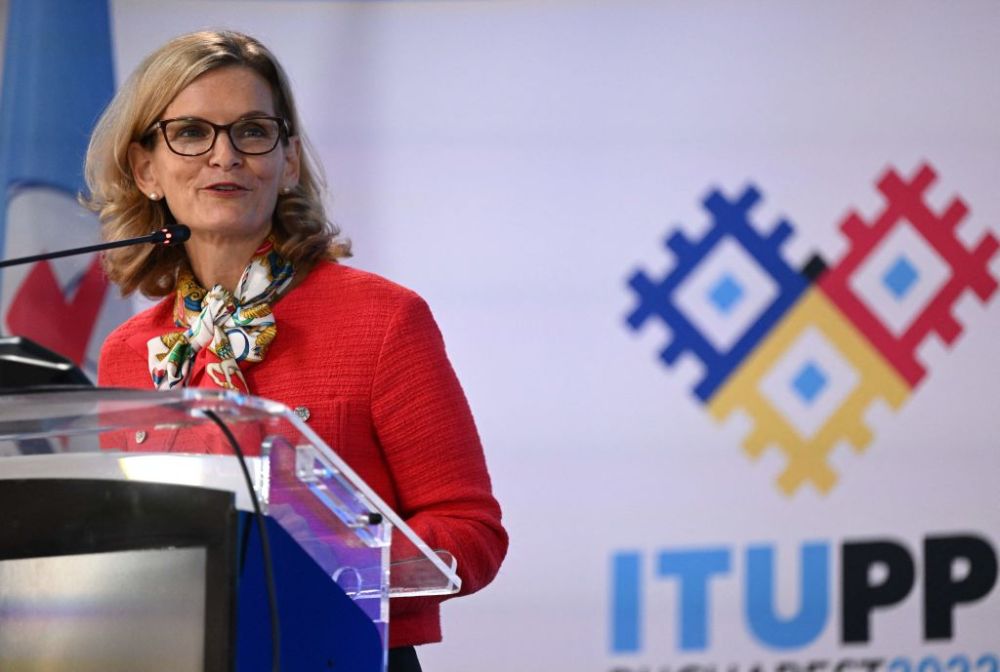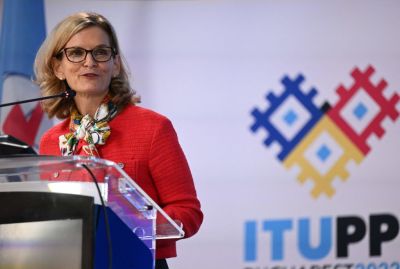We Just Saved the Internet (For Now)
The United States has defeated Russia to assume leadership of the United Nations’ International Telecommunications Union (ITU), a little-known but important agency at the heart of international technical standards. In the nerd version of Rocky IV, American diplomat Doreen Bogdan-Martin beat Moscow’s Rashid Ismailov to become the ITU’s leader for the next four years, receiving 139 of 172 total votes. While there was no awesome montage of Bogdan-Martin’s workout routines and there’s also no evidence that Ismailov used any type of performance-enhancing drugs, this was an epic beatdown and a win for the forces of freedom. (Trust me, you owe it to yourself to watch the video below.)
The election happened at the conclusion of the ITU’s 2022 Plenipotentiary Conference in Bucharest, Romania, and is an important culmination of American efforts to re-engage international forums that are shaping the internet. Other down-ballot election results are equally encouraging.
Russia also lost its seat on ITU’s radio regulatory board and was shut out of a broader regulatory council. Iran, likewise, lost its council seat. China got a bit of humble pie too: In 2018, Houlin Zhao ran unopposed to become ITU’s secretary-general but Beijing’s candidate in this year’s races only came in third for a much less prestigious position—significantly reducing China’s influence on the ITU.
Here’s what I’m thinking (HWIT):
The ITU matters. Originally established in 1865 as the International Telegraph Union, the organization is almost 80 years older than the U.N. and its original mission was to standardize things like Morse code and international distress calls. Now it helps shape global technology and communications standards and interoperability requirements. Therefore, this body is important because those who control the standards control the internet and everything that connects to it. If you want to know more, I highly recommend this report by Brett Schaefer and my AEI colleague, Danielle Pletka.
Over the last decade, authoritarian governments like Moscow and Beijing have deliberately increased their influence on international bodies like the ITU to incrementally shape global technology standards. This is, in part, what fueled the rise of companies like China’s Huawei and Russia’s satellite company Intersputnik, which were able to promote their technology standards and influence how other nations develop their technological infrastructure. In fact, in this recent election, Ismailov specifically promised to reject American online “dominance” if he were elected.
Commenting on the importance of this vote, the head of the Internet Corporation for Assigned Names and Numbers (ICANN), Göran Marby, told Wired that, if the wrong person won, “The risk of internet fragmentation would be very real, and the interoperability of the internet would be jeopardized.” So yeah, kind of a big deal.
We should give credit where credit is due. The Trump and Biden administrations deserve praise for their decisions to re-engage international bodies like the ITU and to diminish the influence of bad-guy governments on these organizations. The turn began under Trump, who viewed influencing organizations like ITU as critical to confronting China’s rising technological advancement, and it has continued under Biden’s plans to do the same.
The “splinternet” is still coming. These are all good developments, but broader geopolitical trends mean some government regimes will still try to build independent “authoritarian-nets.” I’ve said it countless times: Securing nations means securing networks, and authoritarian governments increasingly believe that securing their networks means controlling every piece of hardware and software they contain. China, Iran, Russia, and other similar governments are not going to prioritize “interoperability” or “global cooperation” over their own ability to control their populations or over their perceived security requirements. And so, they will continue building alternative internet structures. American leadership of the ITU will help to limit the impact of these isolating efforts on the broader international community, but it will not stop them.
Musk, Twitter, and Where This All Goes
Elon Musk has officially taken over Twitter. Now we’re going to watch him learn about everything that comes with it.
In moves that should surprise no one, he has dissolved the company’s board of directors and fired CEO Parag Agrawal, CFO Ned Segal, and policy head Vijaya Gadde (you can listen to a podcast I recorded last year with Gadde here, if you like). The Washington Post also reports that he plans to remove 25 percent of his 7,500 or so employees in the near term. This, of course, is causing a stir among the different tweep flocks.
Soon after Musk took over, #LeaveTwitter was trending on the site, with entertainers like Téa Leoni (Madam Secretary), Shonda Rhimes (creator of Grey’s Anatomy), Alex Winter (Bill of Bill & Ted’s Excellent Adventure), and Sara Bareilles (singer, songwriter, actress, and author) threatening to fly the coop. So far, the world is still turning, but plenty on the political left are saying it’s only a matter of time before democracy as we know it collapses.
“A lot of fairly dangerous and misleading sources of information might be allowed back on which could be really bad for not just Democrats but for society in general,” Tim Lim, a longtime Democratic strategist, told Insider. “So, whether it’s vaccine misinformation, or whether it’s actual political disinformation or misinformation in general, it’s going to be something that we have to be on the lookout for.”
But many on the political right think this is the apotheosis of Elon Musk and the dawning of a new era of American freedom.
Of course the Heritage Foundation is also chiming in with the kind of serious and informed policy analysis we’ve come to expect.
But, amid the silly pearl-clutching and lib-owning, there are some interesting aspects to this story, so HWIT:
All the MAGA-cons who think it’s about to be open season on Twitter are in for a real disappointment. In what must be a total buzzkill for many of the online “new” right, Musk tweeted that Twitter will “continue to combat hate & harassment & enforce its election integrity policies,” and said several banned high-profile accounts like former President Trump’s will not be considered for reinstatement until Twitter sets up a new content moderation council. This council will reportedly be responsible for policing the platform and for making decisions about future user bans. In other words, despite all the hype and excitement, actual content moderation changes will likely be minimal.
By keeping Twitter’s “hate,” “harassment,” and “election integrity” policies, Elon is signaling that his version of Twitter will operate largely from the same general worldview as all the other large social media platforms—a worldview decisively shaped by progressive understandings of “word violence” and “dehumanizing attacks.” This shouldn’t be surprising because (1) Musk is a social liberal, (2) he wants to limit his legal liabilities, and (3) social media platforms that have tried to abandon moderation—like Truth Social and Gab—have terrible user experiences and are failing as companies. If he actually does what so many of his currently fawning MAGA supporters want him to do—make Twitter a free speech free-for-all with essentially no limits on content—the company will quickly hemorrhage users and advertisers, and that’s bad business.
Similarly, the planned content council means Musk is going to outsource moderation and enforcement decisions to a group of legal, technical, disinformation, and other experts—just like other platforms have—and there’s no reason to believe this group is going to arrive at radically different conclusions from those of other groups of advisers. Which brings me to my next point.
The hounds will turn and bite the bird. It is inevitable that Twitter will again ban someone the online right thinks is being oppressed or censored. Even if Trump returns to the platform, is there any doubt that the former president will immediately walk up to the new line of acceptable behavior, spit on it, and then confidently walk across it as he continues his never-ending effort to shock and enrage? If Twitter is intent on having “election integrity” policies, then Musk is already on an unavoidable collision course with Trump, Mike Lindell, Dan Bongino, and the whole MAGA crew. And when this happens, they’ll savage the new Twitter just like they did the old one.
This could become a national security story. It turns out that one of Musk’s key backers in his acquisition of Twitter is a company partially owned by Saudi Arabia’s sovereign wealth fund. While not unprecedented or particularly surprising, this is drawing some concerned looks from policymakers.
Earlier this week, Sen. Chris Murphy issued, wait for it, a tweet thread calling for these Saudi ties to be investigated.
“Today I am requesting the Committee on Foreign Investment — which reviews acquisitions of U.S. businesses by foreign buyers — to conduct an investigation into the national security implications of Saudi Arabia’s purchase of Twitter … We should be concerned that the Saudis, who have a clear interest in repressing political speech and impacting U.S. politics, are now the second-largest owner of a major social media platform … There is a clear national security issue at stake and [the Committee on Foreign Investment] should do a review.”
It should be said that Murphy’s characterization isn’t exactly correct. Saudi Arabia hasn’t “purchased” Twitter. In reality, Saudi Prince Alwaleed bin Talal and the Saudi Arabian Kingdom Holding Company invested in the platform in 2011 and 2015 and those investments are being “rolled over” as part of Musk’s acquisition. It is true, however, that the Saudis are the second-largest investor behind Musk himself and there is a larger point to be considered.
As report after report after report of China-owned TikTok’s malfeasance comes out, it’s understandable to have concerns about yet another social media platform potentially being influenced by a foreign government, especially one with a history of oppressive authoritarianism. That said, the Saudis have a ton of other U.S. investments that are likely far more potentially problematic than Musk’s side gig. Even so, because bad actors are abusing social media platforms, foreign direct investment, and international trade to gain advantage over the United States, political leaders on both sides of the aisle are now seriously considering formerly unthinkable actions, like banning any technology investment from countries like China and Russia. While I’m not that worried about this particular investment, I’m sympathetic to these concerns. But I also hope we can navigate them while doing as little damage as possible to global free trade and our own economy. Of course, this requires good faith actors on the other side, so time will tell.
That’s it for this edition of The Current. Be sure to comment on this post and to share this newsletter with your family, friends, and followers. You can also follow me on Twitter (@KlonKitchen). Thanks for taking the time and I’ll see you next week!







Please note that we at The Dispatch hold ourselves, our work, and our commenters to a higher standard than other places on the internet. We welcome comments that foster genuine debate or discussion—including comments critical of us or our work—but responses that include ad hominem attacks on fellow Dispatch members or are intended to stoke fear and anger may be moderated.
With your membership, you only have the ability to comment on The Morning Dispatch articles. Consider upgrading to join the conversation everywhere.